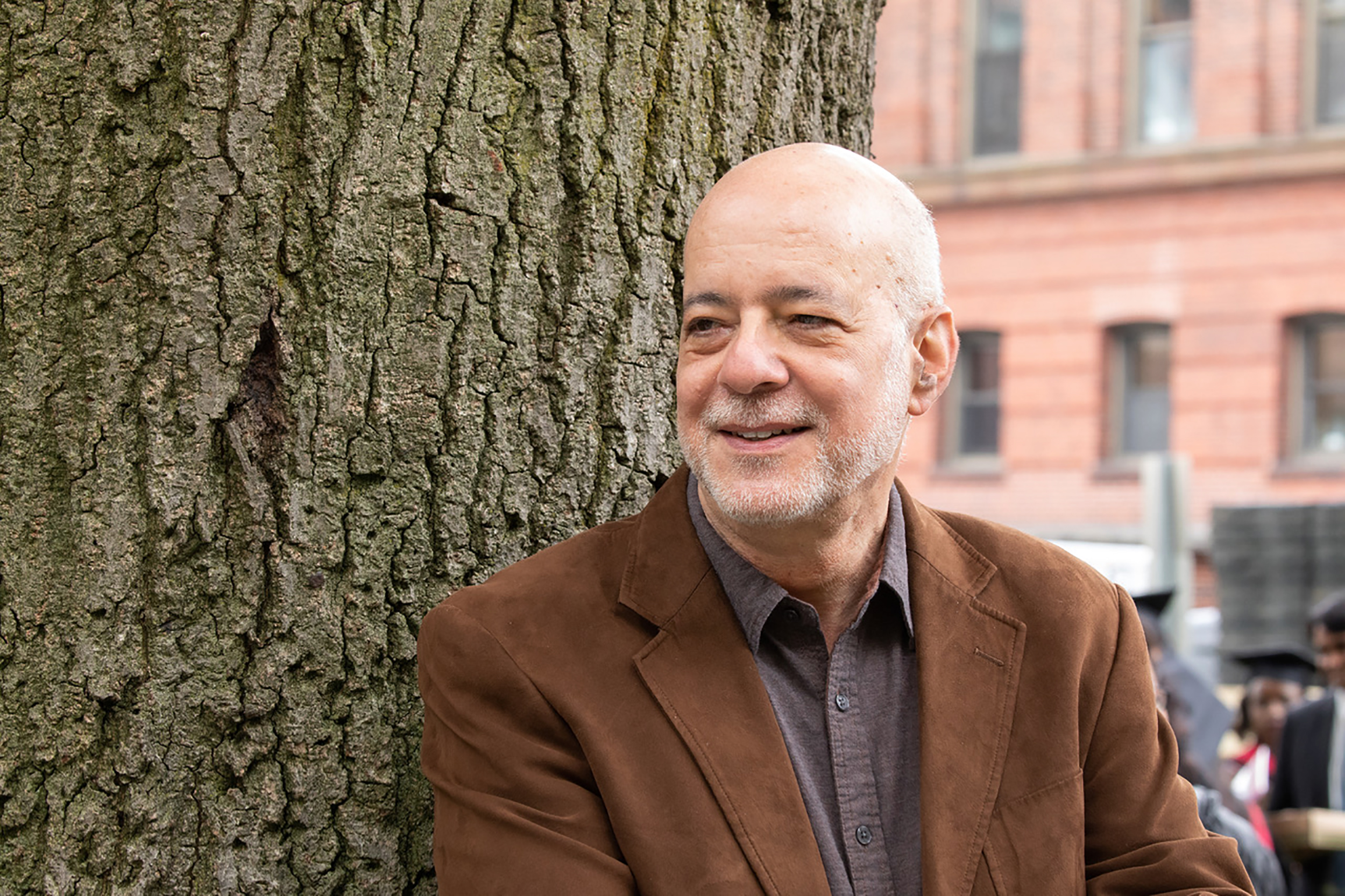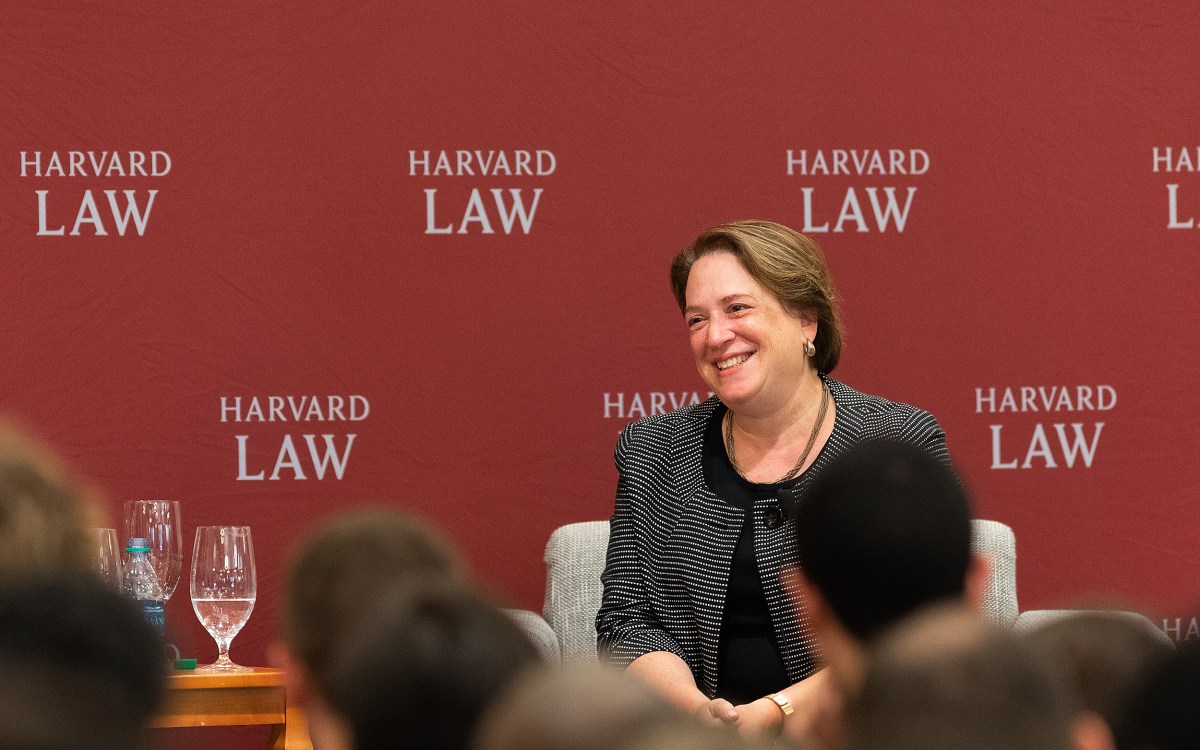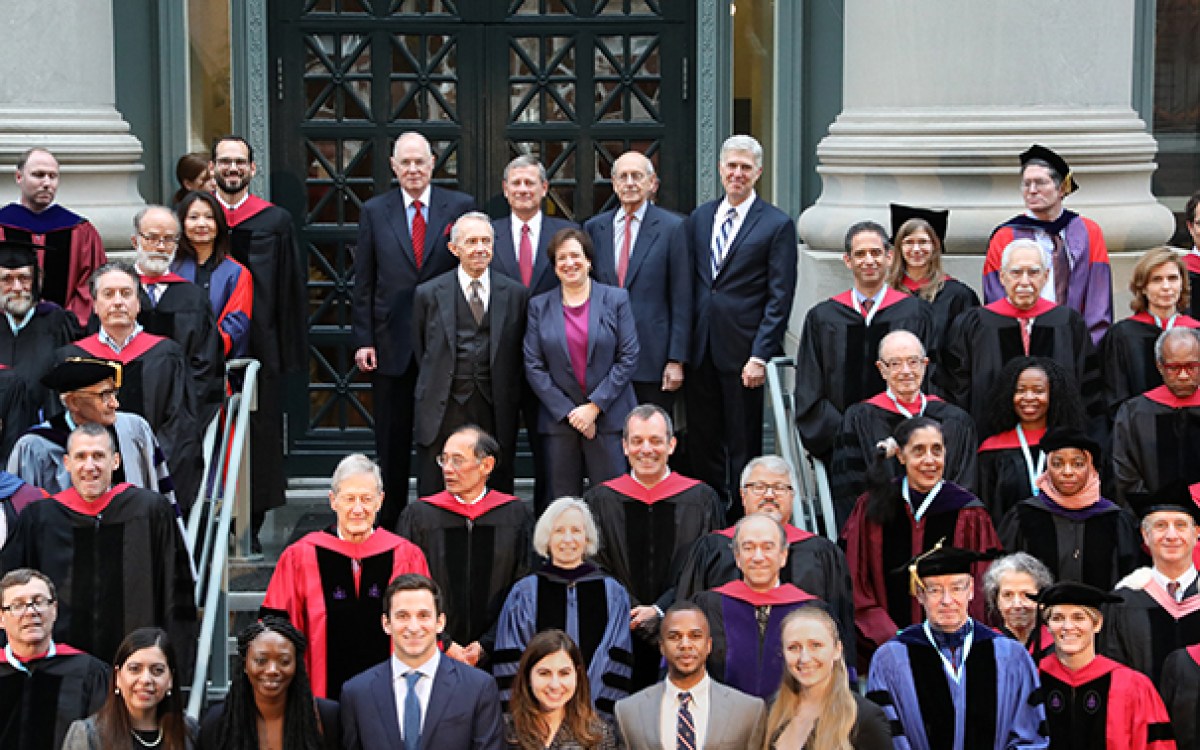
Joseph William Singer is the Bussey Professor of Law at Harvard Law School.
Photo by Martha Stewart
Need advice on civil discourse? Ask someone who argues for a living
Law professor’s new book on persuasion highlights the value of seeing the other side
In this age of extreme polarization, it sometimes can seem as if civil discourse is dead. However, it survives and thrives in the American courtroom, where lawyers and judges daily engage in adversarial yet respectful dialogue to sort out disagreements about the law. In his new book “Persuasion: Getting to the Other Side,” Joseph William Singer, Bussey Professor of Law at Harvard Law School, describes the methods lawyers use to persuade and engage in civil discourse that all Americans, including politicians, could learn from. The Gazette sat down with Singer to talk about how persuasion works and its importance, as well as how to open a conversation with someone on the other side.
Q&A
Joseph William Singer
GAZETTE: What is the first step in persuasion?
SINGER: I would say the first step is to listen. In a time of great partisanship, where people seem divided by issues, and sometimes by identity and religion, and a number of other things, it’s very easy to forget that we have common values and that we have a lot more in common than people realize. When people have strong feelings or opinions about different issues, they’re focusing on a particular situation, and they imagine that other people aren’t worried at all about the same things they’re worried about. Even when people have very strong intuitions about a particular issue, the fact that other people have conflicting strong intuitions is often an indication that if we were to change the facts a little, people would realize that they agree with the other side more than they realize. The second thing would to be to be humble and to realize you have things to learn from other people and figure out what is motivating them and assume that they’re acting in good faith. Then, you would have to see if there’s some way for you to understand some of the other people’s concerns and that they may be right about something. It could also be that you’re still right, but the task is to find a way to talk with each other that looks for common values because they seem not to be there in the heat of an argument, but they usually are there.
There are preconditions to persuasion, and those include believing that there are such things as facts. If you just don’t believe there are facts, it’s impossible to have a real conversation because there’s no basis for discussion.
GAZETTE: In your book, you write that persuasion is possible only when the two parties are willing to engage in dialogue. But what is one to do if the other party is not willing to engage?
SINGER: You can’t persuade someone who won’t listen to you. In Plato’s “Republic,” that very question is asked, “Can you persuade us if we refuse to listen to you?” And the answer is “Certainly not.” I’m not a psychologist, and I don’t have special tricks to get people to be willing to have a conversation with others. At the same time, I think that there are things one can say that may make it more likely that people will be willing to listen. One thing I would say is to be respectful. If you just start by insulting someone, or calling them names, or with anger, then conversation is not possible because anger shuts people down. It also helps to assume that they’re acting in good faith, that they really believe what they’re saying.
I don’t think it’s necessarily a closed case that conversation cannot happen. If you can start by saying, “I hear you saying this,” or “Let me see if I can repeat what you said,” that helps a lot. I have seen some writing that says that the very fact of feeling that you were heard is a way to open up the possibility of conversation, which is the prerequisite to persuasion by discussion or argument.
“ I think that there are things one can say that may make it more likely that people will be willing to listen. One thing I would say is to be respectful.”
GAZETTE: What are the techniques or methods lawyers use to persuade and engage in civil discourse that we all could learn from?
SINGER: Lawyers focus on concrete facts, situations, and disputes. Rather than talking in the abstract and saying, “I’m in favor of religious liberty, and therefore I should win,” we actually talk about the facts of the case. We try to look at the issues from the point of view of both parties. Focusing on concrete cases, and connecting facts and situations to real values and commitments that we have about morality and justice also helps find common ground. Thinking concretely may help you realize that you, yourself, might change your mind if the facts were a little bit different. A very simple example is: Do you think it’s wrong to kill another person? The general answer is yes. But what about if it’s in self-defense? If you’re a Quaker, you may say, “It still is wrong to kill.” Most people would say, “Oh, that’s different.”
Another technique is to look at the limits of the principle or the value that you’re talking about. When I’m talking about values, I’m talking about things such as dignity, security, privacy, the ability to exercise religious freedom through association and worship and prayer, and the ability to determine where you’re going to live and who your friends are, etc. There are many values, and they sometimes conflict. That’s where lawyers come in and where the law comes in. Often, when those values conflict, we have to figure out how to draw a line between them.
The other thing is recognizing that there are standard arguments and counter-arguments. For example, if I’m playing violin in my house, my neighbors may hear it and may not like my playing. I’m not a professional violinist. Do they have a right as property owners to get me to stop playing violin? The answer is probably no because I have a right to use my own home. But do I have the right to play at three o’clock in the morning when they’re trying to get their baby to sleep? The answer is no. Freedom versus security is one of the core conflicts that we see in many areas of moral and legal disputes. A lot of disputes about politics are very similar to the disputes that lawyers have about particular cases.
GAZETTE: In your book, you also mention two other techniques lawyers use: storytelling and framing the issue. How could they help improve civil discourse in political debate?
SINGER: One of the many ways people persuade each other and engage in moral reasoning is to tell stories. Telling a story is a way to get across who’s the victim and who’s the villain. And you can talk about exactly the same set of facts with a different moral valence. Back when the O.J. Simpson trial happened, one version of the story was that he was rich, famous, and handsome, and the question in this version was, “Are you going to let him get away with murder?” And that leads me to the next technique, which is framing the issue. When you frame the issue as, “Are you going to let someone get away with murder?,” that question has a built-in answer. Of course, you don’t let someone get away with murder. But the defense attorney had a different way of framing the issue. When he said some of the evidence was planted by the police, doesn’t that raise reasonable doubt about all of the evidence? Well, that question also has a built-in answer, which is yes.
Partly what is going on in conversation is alternative stories about what happened, different ways to frame the issue, and then using arguments in the context of storytelling that engages our moral intuitions. When you have different versions of the story, that is very helpful for people to see why the issue is complicated and hard rather than simple. If you tell stories others can grasp, then there’s a basis for mutual understanding, if not mutual agreement.
GAZETTE: Why is persuasion important for civil discourse and the rule of law?
SINGER: The rule of law, at least the way it operates if done well in the United States, uses civil discourse. Lawyers and judges are trained to engage in civil discourse. Both lawyers and judges are trained to listen to the arguments on both sides to try to see what’s right about each side’s argument. And when the judge makes a decision, they have to write an opinion to justify what the rule of law is. When judges write opinions, they have three main audiences. One is lower-court judges, to tell them, “Here’s what you should do in cases like this in the future.” The second audience is the general public, but the third and most important audience is the losing side. The judge should be writing an opinion that tells the losing side, “I heard you. I listened to you. Here’s what you said,” and that puts their argument in its most charitable light, and explains why they are losing by reference to values both sides have in common.
All of these practices of civil discourse, such as listening with an open mind to the other party’s argument, finding common ground, and being respectful, help preserve the rule of law. There’s a lot of diversity of views in the United States. In my opinion, that’s a blessing. But at the same time, there are fundamental common values that people hold: liberty, equality, democracy, rule by the people, and fundamental constitutional rights. We are a free and democratic society; we are not a fascist society, or we hope not to be. Judges have to use those common values to give reasons for their decisions. They can’t say, “Here’s the rule of law because it’s what it says in Genesis, Chapter 12.” That’s not what judges can say. They have to base their opinions on values that we hold in common that justify and support our political and legal system. In hard cases, judges have to minimize unfairness. There’s often no way to avoid unfairness, and it’s helpful to recognize the unfairness of what you’re doing as you’re trying to approach justice as much as possible. That’s a way to show respect for the losing side and to honor their humanity and dignity.
“Part of my reason for hope is that if you look at the places in our society where civil discourse still exists, you will find that it exists in the courts.”
GAZETTE: How can persuasion work when talking about issues that are so polarized, such as climate change or wearing masks?
SINGER: There’s no magic bullet. In my book, I use arguments everybody makes all the time from fairness, dignity, and equality to social welfare to democracy and the rule of law. It’s not as if somehow there’s a set of arguments that liberals make and another set of arguments that conservatives make. Those are arguments everybody uses at some point. If people are willing to have a conversation, you can help people become aware of the fact that they themselves embrace all of those arguments, and that there can be discussion about a contested issue based on the fact that if we agree on all those arguments, we can find a way to put them together.
GAZETTE: At this moment in which society is so divided over many issues, how hopeful are you that civil discourse can prevail?
SINGER: I tend to be an optimist, partly because when I was a child, there was a quote in the newspaper that I read and have never forgotten, “Pessimists often turn out to be right, but optimists have more fun along the trip.” And also, I’m Jewish, and part of my understanding of Judaism is to have radical hope.
The main message of my book is that we do have common values. And that if we focus on those common values, it’s possible for people to see that they agree more than they realize they do. Part of my reason for hope is that if you look at the places in our society where civil discourse still exists, you will find that it exists in the courts. In the courtroom, judges and lawyers are not yelling at each other. They are engaging in and embracing a culture of civil discourse. In law schools and among judges, there is disagreement about what the law is and what it should be, but in general that disagreement takes place through reasoned argument, through storytelling, through framing issues, through recognizing what’s right about the other side’s argument, through making factual distinctions, and specification of common values as they apply to concrete cases.
Now, I know in this time there is worry about the politicization of the Supreme Court. That is a real worry. If the Supreme Court does things that are too far different from general norms, then the rule of law will have less respect, and people will be less willing to obey the law, and we will have more problems of civil unrest. Civil discourse is possible. In my daily life as a lawyer, I see examples of civil discourse occurring all the time. It also happens in religious settings. If you just look at Christianity, Islam, and Judaism in the United States, all of them believe that human beings are created in the image of God, have inherent dignity, and that God loves us equally. They all believe that human beings matter and that human life matters. When you think about the fundamental religious values that people have, that also suggests that there is a basis for fundamental agreement about the importance of human dignity and the equal worth of each person.
This interview has been condensed and edited for length and clarity.






